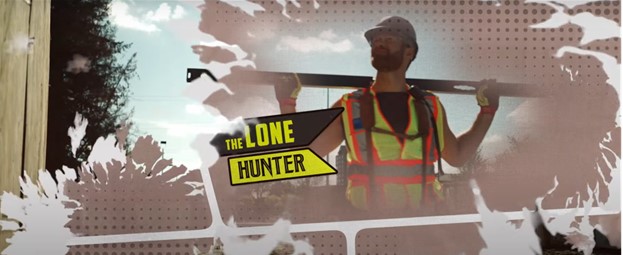The Lone Hunter video encourages construction workers to reach out if they are experiencing mental health challenges.

Video still from The Lone Hunter
The narrator in The Lone Hunter speaks in the dramatic tones of a 1960s-style nature show. While the approach is whimsical, the subject matter is serious – it features a construction worker who suffers inside but hides it at work, until he can’t.
The video is part of RE-MIND, an ongoing program to help improve construction workers’ access to mental health services. RE-Mind is a collaboration between the BC Construction Safety Alliance (BCCSA) and Work to Wellness Rehabilitation Inc.
Developed as a toolbox talk, the video is meant to start an at-work conversation about mental health, notes Erin Linde, BCCSA’s director of Health and Safety services. “It was meant to be a little bit silly on purpose to get people talking and laughing and starting to discuss issues,” she says. “People need community and support. They need to know that it’s okay to say we’re not doing okay. Our whole goal, in developing RE-MIND, is to try to break stigma.”
If you’re struggling, you’re not alone
According to Statistics Canada, “33 per cent of men in the construction industry report poor mental health. In addition, 64 per cent of construction workers wished their employers did more to support mental health initiatives.”
It’s crucial for everyone to recognize that we all grapple with mental health challenges at various points in our lives,” says Erin. “Even if only one person opens up about their experiences, it sends a powerful message that others may relate to. It’s important to acknowledge that many people face similar struggles, and it’s perfectly okay to discuss them openly. There’s no need to endure these challenges in isolation; breaking the silence can be the first step toward healing and understanding.”
Knowing how to recognize mental health challenges is crucial. “Everyone goes through times of stress, fear, worry and feeling down,” reads the RE-MIND website. “But when those feelings get really bad or go on for a long time, you may have depression or anxiety.”
Thank you to Erin for speaking with us.
Need help?
If you are struggling with your mental health and need support, call the B.C. Mental Health Support line at 310-6789 (no area code needed), anytime of the day or night. If you, or a family member, has been injured at work and you need emotional support, call the WorkSafeBC Crisis Support Line at 1.800.624.2928.


